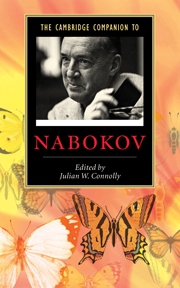Introduction
the many faces of Vladimir Nabokov
Published online by Cambridge University Press: 28 May 2006
Summary
Vladimir Nabokov was acutely aware of the image that readers and critics held of him. Deriding the notion that he was a “frivolous firebird,” he predicted that the day would come when someone would declare him to be a “rigid moralist kicking sin” and “assigning power to tenderness, talent, and pride” (SO, 193). Not only did Nabokov's prediction come true, but critics continue to discover new facets of the writer's legacy to highlight and explore. As a result, it has become clear that the man and his work evince enormous complexity. The facile labels applied to Nabokov early in his career - the “cool aesthete,” “impassive gamester” - have been replaced by other labels (if not “rigid moralist,” then “highly ethical” writer, metaphysician, philosopher). Yet all of these labels are proving to be simply one-dimensional; the full depth of Nabokov's talent has yet to be plumbed. Indeed, in recent years, new aspects of Nabokov's formidable intellectual legacy, such as his research as a lepidopterist, have begun to receive serious notice.
The present collection does not attempt to be encyclopedic in scope or coverage. Nabokov and his artistic legacy have too many dimensions to receive comprehensive treatment in a volume such as this. Instead, a group of distinguished Nabokov scholars has been asked to provide the interested reader with some new critical pathways into Nabokov’s rich creative landscape. Readers with some familiarity with Nabokov’s work will encounter thought-provoking treatments of Nabokov’s art and its place in a variety of cultural contexts.
- Type
- Chapter
- Information
- The Cambridge Companion to Nabokov , pp. 1 - 8Publisher: Cambridge University PressPrint publication year: 2005



